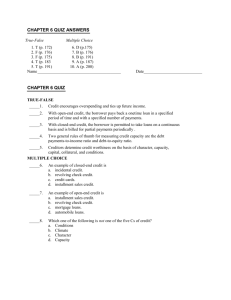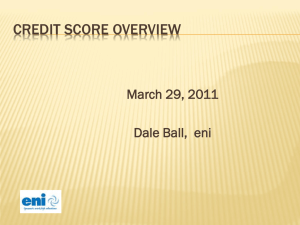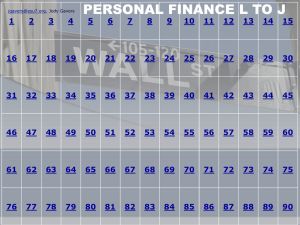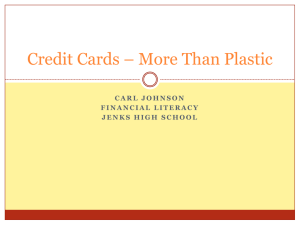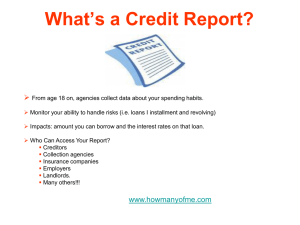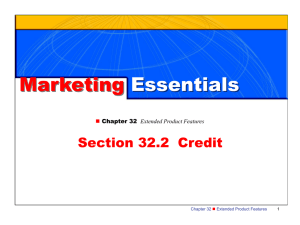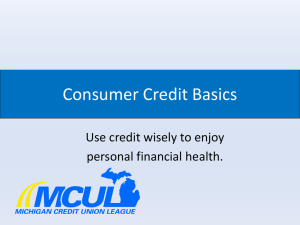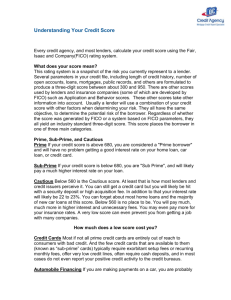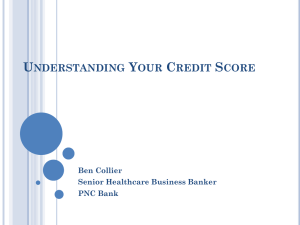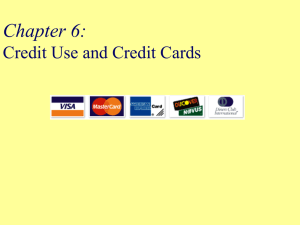Secrets of Credit Scores
advertisement
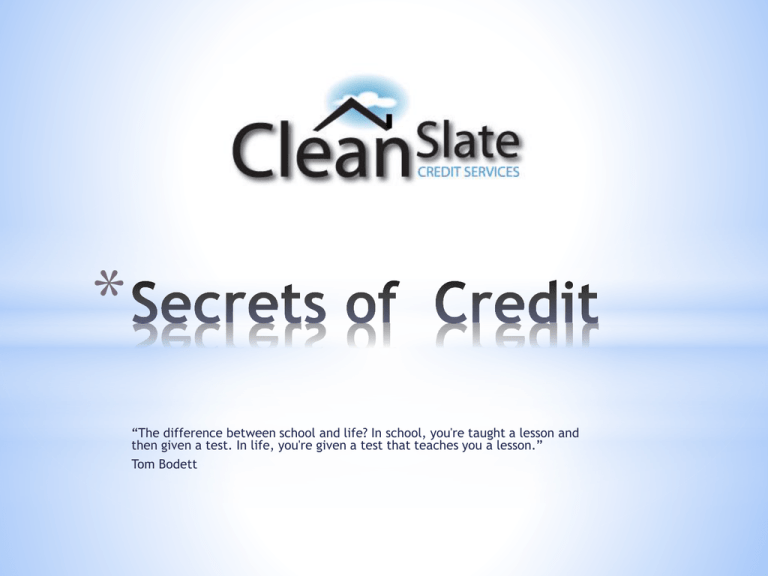
* “The difference between school and life? In school, you're taught a lesson and then given a test. In life, you're given a test that teaches you a lesson.” Tom Bodett * The “Top 10” credit mistakes Credit score implications FICO scoring industry secrets How to read a credit report Identifying credit repair candidates How to improve a credit score * * * Because of your credit score, a small difference of just 2% in your mortgage rate can cost an additional $100,000 of interest over the life of the loan for an average $150,000 home. * A 30-Year Comparison Good Credit Monthly Payments $200,000 mortgage payment $1,043.00 $20,000 car payment (1st car)$333.38 $20,000 car payment (2nd car)$333.38 Car insurance (two cars) $170.00 Home insurance $87.50 Total monthly payments $1,967.26 Poor Credit Monthly Payments $200,000 mortgage payment $1,539.00 $20,000 car payment (1st car)$485.83 $20,000 car payment (2nd car)$485.83 Car insurance (two cars) $225.55 Home insurance $120.83 Total monthly payments $2,857.04 Increased monthly cost is $889.78 due to damaged credit! Monthly savings from example $889.78 30 years X 12 = 360 months X 360 Total cost of bad credit over 30 years? $320,320.80! * Maxed-out card * 30 day late payment * Debt settlement * Foreclosure * Bankruptcy 10 to -30 60 to -80 45 to -65 85 to -105 130 to -150 * PAY EVERYTHING ON TIME! * IF you see a problem, CALL YOUR CREDITOR to work something out. Avoid 30 day late payments at all cost. * * Not Government institutions, * For profit (big profit)private companies in business to track , collect, record, and sell information on every single person with a social security number. * They record every dollar you have ever borrowed, and how you paid it back * They track every move you have made, recording each new address * Every employer you have had * Every time you have ever asked for credit * Components of a credit score Formula to predict the statistical chance of a consumer becoming 90 day late on a particular loan obligation over 24 months The Score is generated by analyzing the information contained in the consumers credit report at that point in time. * Some weighted for mortgages, and some for automobiles. * Many formulas ensures that no one figures it out and beats the system. * Different formulas result in different scores. One score when you try to purchase a car, and an entirely different score for applying for a mortgage. 1. Past Delinquencies… 35% of Credit Score 2. Revolving Debt Ratios (Utilization Ratio) 30% of Credit Score 3. Average Age of Credit File… 15% of Credit Score 4. Mix of Credit… 10% of Credit Score 5. Inquiries… 10% of Credit Score Credit Scoring Components 1. Past Delinquencies 2. Debt Ratio 3. Average Age of File 4. Mix of Credit 5. Inquiries 5 - 10% 4 - 10% 13 - 15% 2 - 30% 35% Closing my unused credit cards will improve my FICO score. True False My FICO credit score should be the same at all 3 credit bureaus. True False When I get married, my credit report is merged with my spouse’s. True False Checking my own credit score will create an inquiry at the credit bureau, and that will lower my score. True False My annual household income is part of the calculation of my FICO score. True False Payment History 35% PAYMENT HISTORY the good, the bad and the ugly * All Payment information on credit cards, retail accounts, mortgage, installment loans, etc. * Public records such as bankruptcy, suits, liens, etc. * Past due accounts. * Accounts paid on time. Credit Accounts 30% CREDIT ACCOUNTS The higher the amount owed, the lower the credit score. * Balance due on accounts. * Accounts with balances. * Proportion of credit limits used on credit and installment accounts REVOLVING (unsecured) INSTALLMANT (secured) Unsecured, revolving accounts are given greater weight than secured installment loans. Unsecured, revolving credit is credit cards. They carry significant weight with the bureaus as they demonstrate responsibility and behavior when given free rein. BEST CREDIT TO HAVE: Unsecured, revolving, open line of credit. This is free rein credit: how do you behave with this? Unsecured credit is simply your promise to pay it back and use it responsibly. * * Affecting your score * Make all payments on time, every time * Do not commit to monthly payment plans unless you are committed to paying them on time, every time. Even small amounts!! * Pay down account balances below 30% * Work to have inaccurate, incomplete data removed from your credit report, Mandated by FCRA law! The only website that’s monitored by the Federal Trade Commission where you will NOT be charged for a copy of your credit report is….. www.annualcreditreport.com You are entitled by law to one FREE copy of your credit report per bureau every 12 months * * If your balances are over 30% of your high credit limit, THAT IS TOO HIGH! Your score is being negatively affected by your high balances. * 1. Get new credit card (secured or unsecured) from your local bank or credit union. Apply in person, this reports the fastest. 2. Use it lightly, Make a payment. Repeat. Keep a low balance on the card at all times, make each payment on time, every time. This activates your credit file and helps builds your score. How does credit repair work? * Request that the item in question be investigated. * Demand proof of the investigation procedures. * Demand proof of verification * Persistent Follow up. * * * Don’t pay off old collections! * This can update old information and have the collection re-post as a new paid collection. * Pay down your high balances and keep them low! Below 30%, BUT NOT TO ZERO. * Don’t engage or settle with creditors! * This updates your DOLA (date of last activity) and hurts your score. No talking to creditors. * Don’t add a formal dispute to your report. This will be a permanent dispute and damage your score. Top 10 MYTHS and Mistakes about credit people make: 1.Paying off old collection accounts believing it will improve their score 2.Filing bankruptcy or using credit counseling as a means to improve credit 3.Applying for new credit to consolidate debt 4.Canceling old credit cards 5.Shopping for credit to get the best interest rates 6.Not using their credit cards at all 7.Using a small amount of credit and then paying it off early, before receiving a bill 8.Using a small amount of credit and then paying it off in full at the end of the month 9.Believing paying things current will fix their credit (late payments compared to on-time) 10.Applying for new credit cards to drive their credit score up Don’t Make these mistakes! * Any debt still exists and may get re-sold to another collection company. It may or may not show up again. Legally they have the right to continue trying to collect unpaid debt. * * Time is on your side, the older the item in question, the less likely it is to get re-sold and re-reported. * Paid collections and charge-offs tend to remain off and not get re-reported. * Un-paid items can show up again. * *
